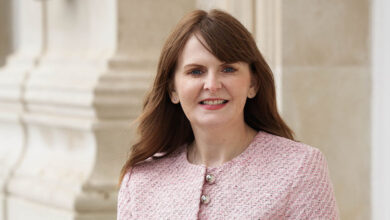From waste management to resource efficiency


The revised Northern Ireland Waste Management Strategy moves the emphasis away from waste management to resource efficiency. While targets for diverting waste from landfill remain central, importantly it now takes a more holistic approach to ensure better resource efficiency and sustainability in Northern Ireland.
The strategy confirms that investment in additional waste infrastructure is crucial in achieving this and that efficient and safe energy recovery from waste can deliver significant environmental benefits, reduce carbon impacts and provide important economic opportunities through energy sustainability, investment and job creation.
Recycling rates plateauing
Great strides have been made in reducing the amount of municipal waste going to landfill, and in increasing recycling and recovery rates in Northern Ireland. In 2002, 91 per cent of municipal waste was landfilled. By 2009-2010 there was an impressive decrease with 66 per cent sent to landfill and nearly 36 per cent recycled. However, since 2011, the rate of recycling has levelled off with 2015/16 statistics showing 42.2 per cent of household waste was recycled, similar to the 2014/15 rate of 42 per cent. At the same time overall municipal waste has increased by almost 2 per cent.
While higher levels of recycling are achievable, at present it is not possible to prevent, reuse or recycle all of our waste. However, as already recognised across the rest of Europe, this residual municipal waste still has significant value in the form of recoverable energy. For example, Confederation of European Waste-to-Energy Plants (CEWEP) figures show that in 2014, just over 3 per cent of Belgian municipal waste went to landfill. This was achieved by a complementary approach which saw recycling levels at 61.61 per cent, alongside 34.16 per cent of residual waste being thermally treated to produce energy.
Complementary solution for Northern Ireland
The Becon Consortium, which is bidding to build a £240 million waste management facility at Hightown Quarry, Mallusk, is proposing a similar integrated approach. The project is designed to help arc21, the umbrella waste management group for six councils in the east of Northern Ireland meet their landfill diversion and recycling targets, while also maximising the value from non-recyclable waste.
The planned facility will process approximately 250,000 tonnes of waste annually, initially recovering recyclable material and increasing arc21’s overall recycling rates by up to 10 per cent through a sophisticated mechanical and biological facility. It will then generate renewable electricity in the adjoining Energy from Waste (EfW) plant – enough to power over 30,000 homes.
Future proofing
While the Waste Management strategy aims to achieve Northern Ireland compliance with ambitious EU landfill diversion and recycling targets by 2020, analysis by the Department suggests the recent EU Commission Communication on the Circular Economy “will have a major impact on our waste management infrastructure requirements”. With greater limitations being proposed on waste to landfill, alongside more ambitious recycling targets of 65 per cent by 2030, they estimate that Northern Ireland will need two to three times more EfW capacity than previously assessed.
Building a resilient, sustainable society
While EU Directives and associated targets have been instrumental in promoting resource efficiency, the strategic importance of waste infrastructure to help Northern Ireland compete globally, and to deliver a more resilient and sustainable society, cannot be underestimated. The recent Institution of Civil Engineers NI manifesto agrees:
“Northern Ireland requires Energy from Waste (EfW) facilities in order to meet its waste management needs. The establishment of EfW facilities would not only negate the cost of exporting our waste and paying for some of the highest energy costs in Europe, but would also contribute to the circular economy through the creation of jobs. If we want Northern Ireland to be a better place to live and work we must promote proximity, self-sufficiency and sustainability.”
The Becon Consortium proposed solution will provide the proven, safe and reliable infrastructure that Northern Ireland needs to manage its waste more sustainably, increase its energy security and deliver the necessary resource efficiency.
Project details can be found on www.becon.co.uk






